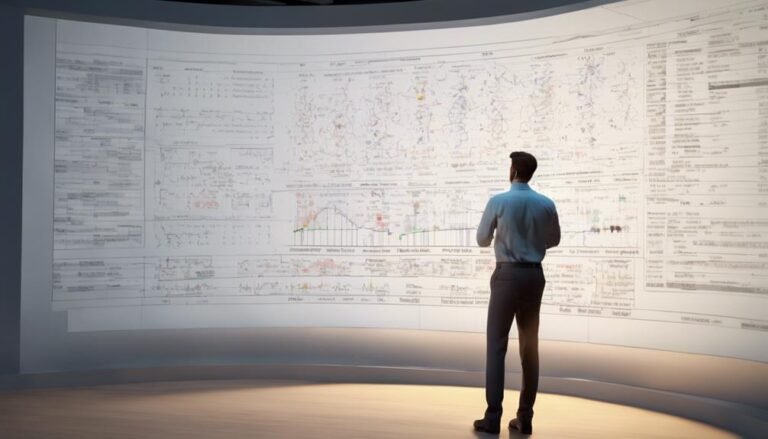Renewable Energy Engineer Job Description
As a renewable energy engineer, you'll assess sites, analyze data, and optimize energy production. Your role involves developing energy models, overseeing installations, and enhancing system performance. A Bachelor's in engineering is required, with advanced degrees and certifications offering career growth. Technical proficiency, problem-solving skills, and communication abilities are crucial. The job outlook is promising due to industry expansion and government initiatives. You'll work on designs, testing, and monitoring, with salaries ranging from $55,000 to $120,000 yearly. Advancement opportunities include project management and research roles. Understanding industry trends is essential for success in this dynamic field. Embrace a rewarding career shaping the future of renewable energy.
Key Takeaways
- Conduct site assessments and data analysis for project feasibility and energy optimization.
- Develop energy models and oversee installation of renewable technologies.
- Monitor and maintain system performance, implementing improvements.
- Required skills include technical proficiency, problem-solving, and communication abilities.
- Job outlook is positive with rapid industry expansion and government initiatives driving demand.
Responsibilities
In the role of a Renewable Energy Engineer, you'll be responsible for designing, implementing, and managing sustainable energy systems. Your responsibilities include conducting site assessments to determine the feasibility of renewable energy projects, analyzing data to optimize energy production, and overseeing the installation of solar panels, wind turbines, or other renewable energy technologies. You'll be tasked with developing energy models to forecast system performance and guarantee compliance with regulatory standards.
Additionally, you'll collaborate with multidisciplinary teams to integrate renewable energy solutions into existing infrastructure, such as buildings or electrical grids. As a Renewable Energy Engineer, you'll also be responsible for monitoring and maintaining the performance of renewable energy systems, troubleshooting any issues that may arise, and implementing improvements to enhance efficiency. Your duties may involve conducting energy audits, preparing reports on system performance, and staying abreast of advancements in renewable energy technology to inform decision-making processes.
Effective communication skills are essential as you'll need to liaise with clients, stakeholders, and regulatory bodies to secure project success.
Education and Training
You need to understand the required education levels and specialized training programs essential for a career as a Renewable Energy Engineer.
The field often demands at least a bachelor's degree in engineering, renewable energy, or related fields.
Additionally, completing specialized training programs can enhance your skills and knowledge in this rapidly evolving industry.
Required Education Levels
A bachelor's degree in engineering or a related field is typically required for individuals pursuing a career as a Renewable Energy Engineer. However, some positions may prefer candidates with advanced degrees such as a Master's or Ph.D. in renewable energy, sustainable engineering, or a similar field.
These advanced degrees can provide a deeper understanding of renewable energy technologies and may open up opportunities for higher-level roles or research positions within the renewable energy sector. Additionally, obtaining certifications in specific areas of renewable energy, such as solar or wind power, can demonstrate expertise and enhance job prospects.
While a bachelor's degree is the minimum requirement, pursuing further education and certification options can help you stand out in this competitive field.
Specialized Training Programs
Several specialized training programs offer in-depth education and hands-on experience for individuals aspiring to become Renewable Energy Engineers. These programs not only provide a solid foundation in renewable energy principles but also offer specialized courses that cater to different career options within the field.
For example, some training programs focus on solar energy systems, wind power technologies, or bioenergy solutions. Additionally, obtaining industry certifications such as the Certified Renewable Energy Professional (CREP) can greatly enhance your credentials and marketability as a Renewable Energy Engineer. These certifications validate your expertise and knowledge in specific areas of renewable energy, making you a more competitive candidate for job opportunities in the industry.
Required Skills
To excel as a Renewable Energy Engineer, you must possess high levels of technical proficiency to design and implement sustainable energy solutions effectively.
Problem-solving abilities are essential as you'll encounter complex challenges that require innovative solutions to optimize renewable energy systems.
Additionally, strong communication skills are important for collaborating with multidisciplinary teams and effectively conveying technical information to stakeholders.
Technical Proficiency Needed
Having a thorough understanding of various renewable energy technologies is fundamental for aspiring renewable energy engineers. Proficiency in renewable energy technologies such as solar photovoltaic systems, wind turbines, hydroelectric power, and geothermal systems is essential.
Additionally, possessing strong engineering expertise in areas such as electrical systems, mechanical systems, and energy storage solutions is vital for success in this role. Renewable energy engineers must be adept at analyzing data, designing systems, and implementing solutions that maximize energy efficiency and sustainability.
They should also be proficient in utilizing software tools for simulations, modeling, and project management. Keeping abreast of the latest advancements in renewable energy technologies and continuously enhancing technical skills are key aspects of excelling in this field.
Problem-Solving Abilities Essential
Shifting from technical proficiency, problem-solving abilities are a core requirement for renewable energy engineers in effectively addressing complex challenges within the field. As a renewable energy engineer, your critical thinking skills and innovative solutions play an important role in driving the industry forward.
Here are four key aspects where your problem-solving abilities are essential:
- Analyzing Data: You must be able to interpret data effectively to identify patterns and potential areas for improvement.
- Developing Solutions: Utilize your critical thinking skills to devise innovative solutions to enhance renewable energy systems.
- Troubleshooting: Being adept at problem-solving is crucial for troubleshooting issues that may arise in renewable energy projects.
- Optimizing Efficiency: Constantly seeking ways to optimize efficiency through problem-solving is integral to the role of a renewable energy engineer.
Communication Skills Vital
Communication skills are essential for renewable energy engineers to effectively collaborate and convey technical information in the industry. Strong communication abilities are critical for explaining complex renewable energy concepts to diverse audiences, including clients, colleagues, and stakeholders.
Clear and concise communication fosters efficient teamwork dynamics, ensuring that projects progress smoothly and goals are met. Renewable energy engineers often work in interdisciplinary teams where effective communication is essential to align everyone towards a common objective. By articulating ideas, listening actively, and providing constructive feedback, engineers can enhance project outcomes and drive innovation in the renewable energy sector.
Hence, honing communication skills is imperative for renewable energy engineers to excel in their roles and contribute meaningfully to the industry.
Job Outlook
What're the current job prospects for renewable energy engineers in the industry?
When considering the job outlook for renewable energy engineers, several factors come into play, influencing career growth and employment opportunities:
- Rapid Industry Expansion: The renewable energy sector is experiencing significant growth globally, leading to an increased demand for skilled engineers specializing in this field.
- Government Initiatives: Many governments are investing heavily in renewable energy projects, creating more job openings for engineers in areas such as solar, wind, and hydroelectric power.
- Technological Advancements: With ongoing advancements in renewable energy technologies, there's a continuous need for engineers to innovate, design, and optimize systems for maximum efficiency.
- Sustainability Focus: As the world shifts towards sustainable energy sources, the role of renewable energy engineers becomes more vital, offering long-term job stability and opportunities for career advancement within the industry.
Considering these aspects, the job outlook for renewable energy engineers appears promising, with a wealth of opportunities for those entering or already established in this dynamic field.
Typical Work Environment
Considering the promising job outlook for renewable energy engineers, understanding the typical work environment is essential for those seeking to excel in this dynamic field. Renewable energy engineers often work in a variety of settings, including offices, laboratories, and sometimes outdoors at project sites. It is important to be aware of the workplace culture and the significance of team collaboration in achieving project goals efficiently. Additionally, being mindful of occupational hazards and following safety precautions is vital to guarantee a secure working environment for all team members.
—
| Work Environment | Description | Examples |
|---|---|---|
| Office Setting | Engineers work on designs, reports, and project planning. | Developing renewable energy systems using computer-aided design software. |
| Laboratory Environment | Testing and analyzing data for renewable energy projects. | Conducting experiments to improve solar panel efficiency. |
| Outdoor Locations | Inspecting project sites and overseeing installations. | Monitoring wind turbine construction for proper assembly. |
Salary Range
The salary range for renewable energy engineers varies based on experience, location, and specific industry sectors. When considering a career in this field, it's essential to weigh the salary negotiation process along with the benefits package offered by potential employers.
Here are some key points to keep in mind regarding the salary range for renewable energy engineers:
- Entry-Level Positions: Starting salaries for renewable energy engineers typically range from $55,000 to $70,000 annually, depending on factors like location and company size.
- Mid-Level Positions: Mid-career professionals in this field can expect a salary range between $75,000 and $100,000, with opportunities for career growth and higher job satisfaction.
- Senior-Level Positions: Seasoned renewable energy engineers with extensive experience may earn salaries exceeding $120,000, often accompanied by additional perks and benefits.
- Specialized Roles: Engineers specializing in niche areas such as solar energy or wind power may command higher salaries, reaching upwards of $150,000, reflecting their expertise and contribution to the industry.
Advancement Opportunities
Exploring career growth paths in renewable energy engineering can reveal a spectrum of advancement opportunities for professionals looking to elevate their expertise and impact within the industry. In the table below, we outline potential career growth options and professional development opportunities for renewable energy engineers:
| Advancement Opportunity | Description | Impact |
|---|---|---|
| Project Manager | Lead large-scale renewable energy projects | Manage project timelines and budgets |
| Research Scientist | Conduct innovative research in renewable technologies | Drive advancements in the field |
| Senior Technical Advisor | Provide expert guidance on complex engineering issues | Influence strategic decision-making |
These opportunities offer avenues for career growth by allowing you to specialize in project management, research, or advisory roles. Pursuing these paths can enhance your skills, broaden your industry knowledge, and position you as a key player in shaping the future of renewable energy. Remember, continuous professional development is vital in staying at the forefront of this rapidly evolving field.
Industry Trends
Amidst the dynamic landscape of renewable energy engineering, staying abreast of current industry trends is important for professionals seeking to remain competitive and innovative. To excel in this field, it's essential to keep a keen eye on the following key trends:
- Market Demand: Understanding the shifting market demand for different types of renewable energy sources such as solar, wind, hydro, and geothermal is essential. Professionals need to adapt their skills and knowledge to meet the current needs of the industry.
- Technology Advancements: With rapid technological advancements in energy storage, grid integration, and smart systems, renewable energy engineers must stay updated on the latest innovations. This knowledge is crucial for designing efficient and sustainable renewable energy solutions.
- Policy Changes: Stay informed about policy changes at the local, national, and international levels. Policies related to renewable energy incentives, regulations, and targets can have a significant impact on the industry and career opportunities.
- Emerging Markets: Keep an eye on emerging markets for renewable energy projects. Identifying new opportunities in growing markets can open up avenues for career growth and innovation.
Frequently Asked Questions
What Are the Common Challenges Faced by Renewable Energy Engineers?
When working as a renewable energy engineer, you'll encounter challenges like regulatory hurdles, project management complexities, resource availability limitations, and grid integration issues. These obstacles demand innovative solutions and strategic planning to overcome.
How Do Renewable Energy Engineers Stay Updated on New Technologies?
To stay updated on new technologies, you continuously engage in learning opportunities. By attending conferences, workshops, and networking events, you connect with experts in the field. This proactive approach guarantees you remain at the forefront of industry advancements.
Are There Specific Certifications That Renewable Energy Engineers Should Pursue?
To excel in your field, consider industry standards like LEED or NABCEP. These certifications boost your expertise and credibility. Prioritize professional development through ongoing training to stay ahead in the dynamic renewable energy landscape.
What Are the Key Differences Between Working in Public and Private Sectors?
Imagine public sector work as a tranquil boat ride, offering steady but slow progress. In contrast, private sector work resembles a thrilling speedboat race, promising higher pay but demanding work-life balance sacrifices. Choose wisely.
How Do Renewable Energy Engineers Contribute to Sustainability Goals of Companies?
You, as a renewable energy engineer, play a critical role in aiding companies to achieve sustainability goals by improving energy efficiency, fostering innovation, and reducing their carbon footprint. Your expertise drives positive environmental impact.
Conclusion
To sum up, renewable energy engineering offers a promising career path with growing demand for skilled professionals. With a focus on sustainability and innovation, this field provides opportunities for continuous learning and development. Embrace the challenge of shaping a greener future through your work in this dynamic industry.
Keep your skills sharp and stay ahead of the curve to thrive in this evolving sector. The future is bright for those who choose to pursue a career in renewable energy engineering.







